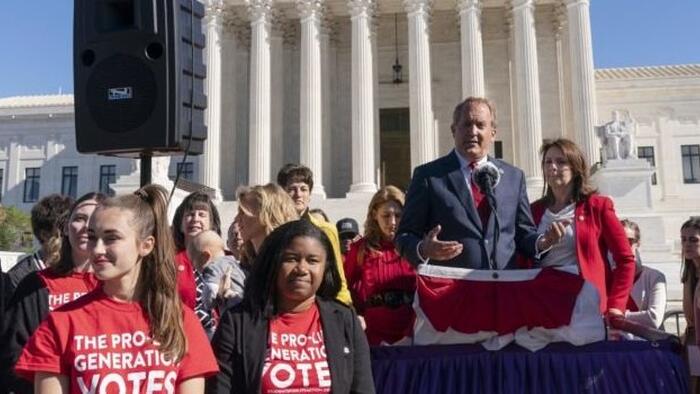Texas Attorney General Ken Paxton has issued a formal demand to the Biden-Harris administration, seeking data to confirm the citizenship status of approximately 454,289 registered voters in Texas. In a letter to USCIS Director Ur M. Jaddou, Paxton expressed his concerns regarding the potential unlawful registration of individuals who may not be U.S. citizens. He underscored the significance of ensuring that only eligible voters participate in the upcoming 2024 presidential election, which is anticipated to be highly competitive. Paxton emphasized in his correspondence that it is crucial for the federal government to assist states in this endeavor, claiming that any remaining non-citizens on the voter registration lists must be identified to maintain election integrity.
This request arises from findings of an investigation conducted by Paxton’s office in conjunction with Texas Secretary of State Jane Nelson, which uncovered individuals registered to vote without valid state identification, such as driver’s licenses or other forms of state-issued ID. Paxton pointed out that the absence of such verified identification makes it exceedingly difficult for state officials to ascertain these individuals’ citizenship status. He stated explicitly that he is not requesting citizenship verification for any voters whose registration records do include valid identification numbers. The investigation further revealed that in an audit of four randomly selected counties, over 1,300 non-citizens were officially found to be registered to vote, a statistic Paxton deemed alarmingly excessive given the razor-thin margins by which many elections are often decided.
Following exhaustive state-level efforts to confirm the citizenship of these voters, Paxton turned to the federal government for assistance. The situation is compounded by the broader political climate and regulatory stances of the current administration, making it uncertain whether the Biden-Harris administration will respond positively to Texas’s request. In contrast, the Department of Justice (DOJ) has recently sued Alabama over the state’s decision to purge 3,251 voters from the rolls due to failure in citizenship verification. Alabama’s Republican Secretary of State Wes Allen justified his actions, asserting his constitutional duty to ensure that only American citizens can vote and that his measures were necessary to maintain election integrity.
The DOJ’s legal action against Alabama has raised concerns about the administration’s stance on state-led voter verification efforts. Critics argue that federal interventions like this may undermine states’ rights to regulate their voting processes. While Paxton’s efforts are aimed at enhancing electoral integrity within Texas, the federal government’s pushback highlights a growing tension between state election officials and federal authorities regarding voter registration policies. Observers note that litigation such as the DOJ’s lawsuit against Alabama illustrates a broader concern about maintaining a balance between protecting voting rights and ensuring that those who cast ballots are legally qualified to do so.
Texas has frequently been at the forefront of electoral integrity discussions, with numerous legislative and administrative measures aimed at reinforcing voter ID requirements and scrutinizing potential cases of fraudulent registrations. The calls for increased verification processes reflect ongoing national debates about voter fraud and citizen participation in elections. Paxton’s demand for federal data access could set the stage for further litigation or confrontations between state and federal authorities, depending on how the Biden-Harris administration responds to this request. If granted, the data requested by Paxton could lead to further identification and removal of non-citizens from Texas’s voter rolls.
In the context of the impending 2024 presidential election, these issues of citizenship verification and potential voter registration fraud are poised to become more contentious. As political tensions rise, both state and federal actors will engage in legal and administrative battles over election laws and procedures around the country. The outcome of these efforts may significantly influence not only the upcoming elections but also the long-term landscape of voting rights and election integrity across the United States.

